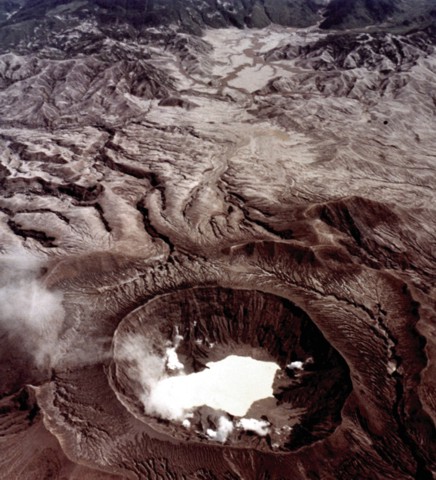Climate study finds evidence of global shift in the 1980s

The ‘regime shift’ was centred around 1987, and was sparked by the El Chichón volcanic eruption in Mexico five years earlier. © By National Aeronautics and Space Administration (NASA), via Wikimedia Commons.
Scientists say that a major step change, or ‘regime shift’, in the Earth’s biophysical systems, from the upper atmosphere to the depths of the ocean and from the Arctic to Antarctica, was centred around 1987, and was sparked by the El Chichón volcanic eruption in Mexico five years earlier.
Their study, published in Global Change Biology, documents a range of associated events caused by the shift, from a 60% increase in winter river flow into the Baltic Sea to a 400% increase in the average duration of wildfires in the Western United States.
“We suggest that climate change is not a gradual process, but one subject to sudden increases, with the 1980s shift representing the largest in an estimated 1,000 years”, said co-author Rita Adrian, Professor at the Leibniz-Institute of Freshwater Ecology and Inland Fisheries in Berlin (Germany).
Philip C. Reid, Professor of Oceanography at Plymouth University’s Marine Institute (UK), and Senior Research Fellow at the Sir Alister Hardy Foundation for Ocean Science (UK), is the lead author of the report. “We demonstrate, based on 72 long time series, that a major change took place in the world centred on 1987 that involved a step change and move to a new regime in a wide range of Earth systems”, he said.
“Our work contradicts the perceived view that major volcanic eruptions just lead to a cooling of the world. In the case of the regime shift it looks as if global warming has reached a tipping point where the cooling that follows such eruptions rebounds with a rapid rise in temperature in a very short time. The speed of this change has had a pronounced effect on many biological, physical and chemical systems throughout the world, but is especially evident in the Northern temperate zone and Arctic.”
Over the course of three years, the scientists – drawing upon a range of climate models, using data from nearly 6,500 meteorological stations, and consulting innumerable scientists and their studies round the world – found evidence of the shift across a wide range of biophysical indicators, such as the temperature and salinity of the oceans, the pH level of rivers, the timing of land events, including the behaviour of plants and birds, the amount of ice and snow in the cryosphere (the frozen world), and wind speed changes.
They detected a marked decline in the growth rate of CO2 in the atmosphere after the regime shift, coinciding with a sudden growth in land and ocean carbon sinks – such as new vegetation spreading into polar areas previously under ice and snow. And they found that the annual timing of the regime shift appeared to have moved regionally around the world from west to east, starting with South America in 1984, North America (1985), North Atlantic (1986), Europe (1987), and Asia (1988).
These dates coincide with significant shifts to an earlier flowering date for cherry trees around the Earth in Washington DC, Switzerland, and Japan and coincided with the first evidence of the extinction of amphibians linked to global warming, such as the harlequin frog and golden toad in Central and South America.
Second author Renata E. Hari, Eawag, Dübendorf, Switzerland, said: “The 1980s regime shift may be the beginning of the acceleration of the warming shown by the IPCC. It is an example of the unforeseen compounding effects that may occur if unavoidable natural events like major volcanic eruptions interact with anthropogenic warming.”
Paper:
The full paper is available to download at: http://onlinelibrary.wiley.com/doi/10.1111/gcb.13106/abstract
Contact:
Professor Rita Adrian
Leibniz-Institute of Freshwater Ecology and Inland Fisheries (IGB), Berlin
Email: Adrian@igb-berlin.de
Phone: 001 775 200 4231
PR office
Nadja Neumann/Angelina Tittmann
Leibniz-Institute of Freshwater Ecology and Inland Fisheries (IGB), Berlin
Email: pr@igb-berlin.de
Phone: 0049 (0)30 64181-975/ -631
About IGB:
The Leibniz-Institute of Freshwater Ecology and Inland Fisheries, IGB, is an independent and interdisciplinary research centre dedicated to the creation, dissemination, and application of knowledge about freshwater ecosystems. Working in close partnership with the scientific community, government agencies, as well as the private sector, guarantees the development of innovative solutions to the most pressing challenges facing freshwater ecosystems and human societies.
Media Contact
All latest news from the category: Studies and Analyses
innovations-report maintains a wealth of in-depth studies and analyses from a variety of subject areas including business and finance, medicine and pharmacology, ecology and the environment, energy, communications and media, transportation, work, family and leisure.
Newest articles

First-of-its-kind study uses remote sensing to monitor plastic debris in rivers and lakes
Remote sensing creates a cost-effective solution to monitoring plastic pollution. A first-of-its-kind study from researchers at the University of Minnesota Twin Cities shows how remote sensing can help monitor and…

Laser-based artificial neuron mimics nerve cell functions at lightning speed
With a processing speed a billion times faster than nature, chip-based laser neuron could help advance AI tasks such as pattern recognition and sequence prediction. Researchers have developed a laser-based…

Optimising the processing of plastic waste
Just one look in the yellow bin reveals a colourful jumble of different types of plastic. However, the purer and more uniform plastic waste is, the easier it is to…



